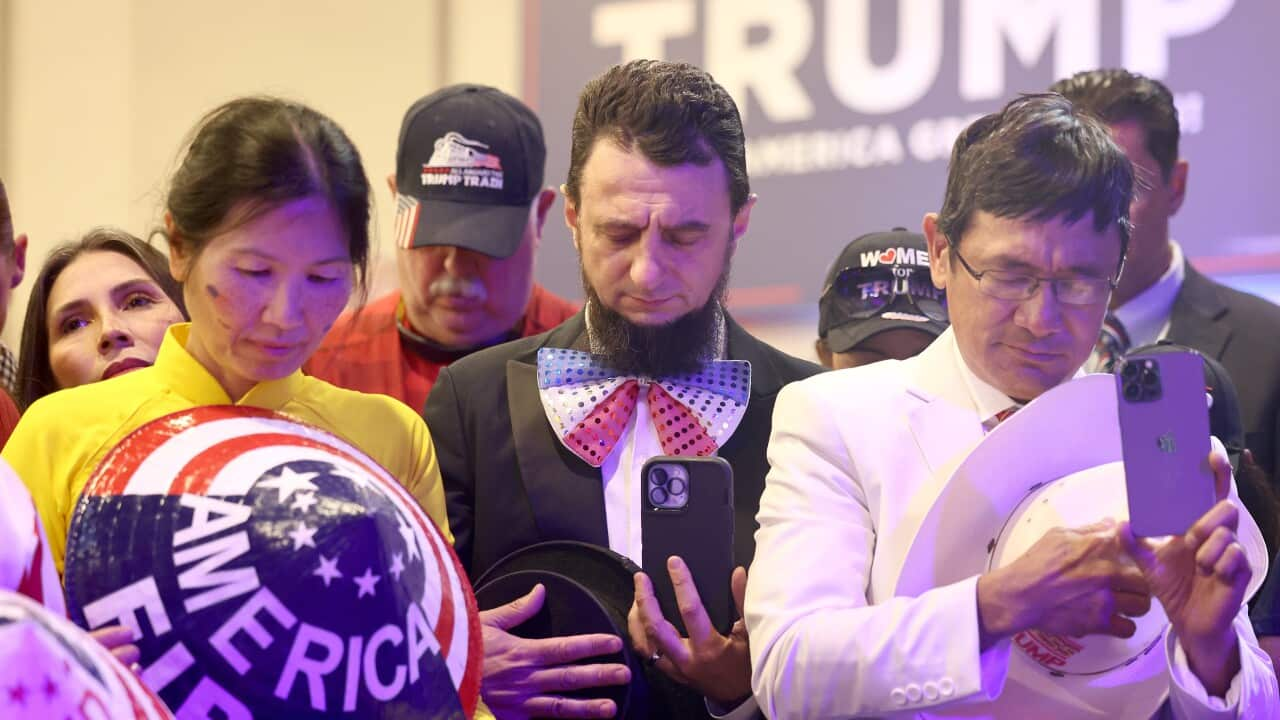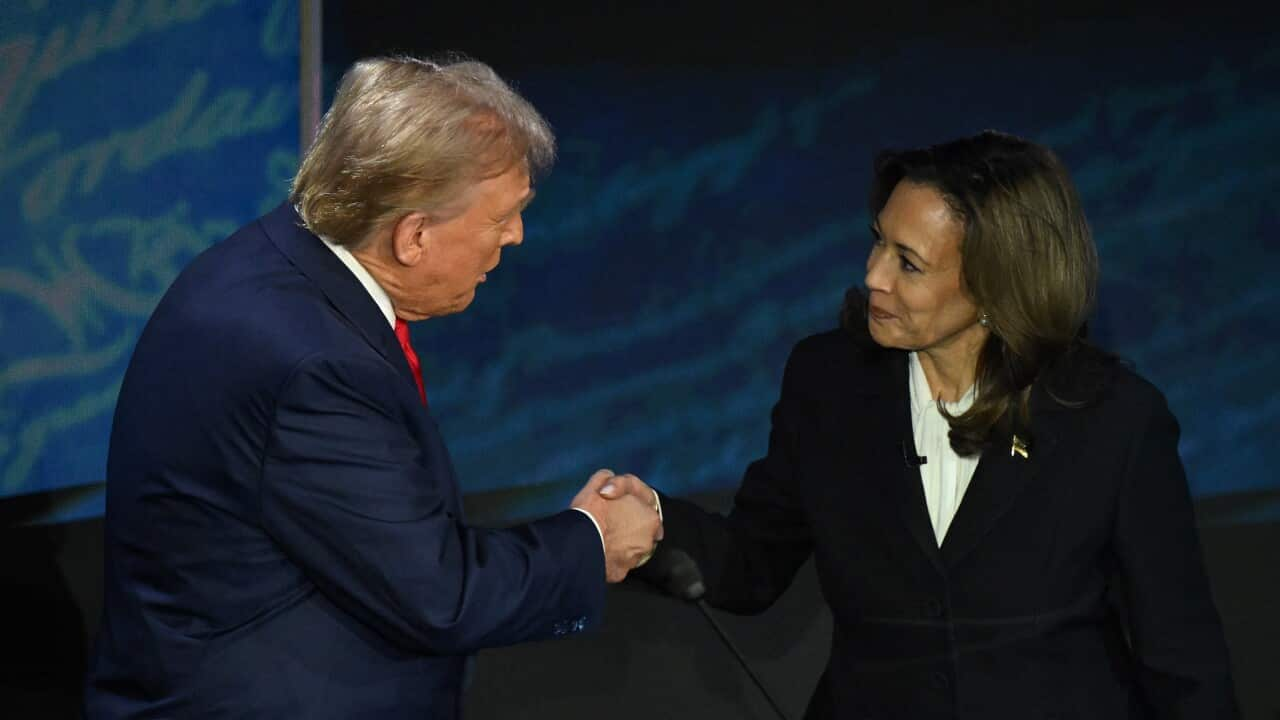When takes to the stage and scans the sea of supporters who've waited hours to see him, the faces looking back are not particularly diverse, but they're not all white either.
Dotted among them are the faces of people from many different backgrounds — Hispanic, Asian and Black Americans — who are backing Trump's bid to become the president of the United States for a second time.
Many support the Republican candidate's plans to tighten border control and crackdown on unauthorised immigrants.
In his speeches, Trump has and painted them as murderers, rapists and "animals".
Trump blames for importing these so-called criminals from the "dungeons of the third world" — including prisons and insane asylums — and resettling them in the country "to prey upon innocent American citizens".
Standing in front of signs saying "deport illegals now" and "end migrant crime", Trump paints a dark picture of America at the mercy of Venezuelan gangs.

In an interview with The National Pulse in October, Donald Trump said undocumented immigrants were "poisoning the blood of our country". Source: Getty / Michael Ciaglo
Trump's unsubstantiated comments about Haitians have also prompted backlash while at the same time becoming the subject of parodies online.
This week at Trump's New York rally, there was fresh controversy over .
"There's literally a floating island of garbage in the middle of the ocean right night — I think it's called Puerto Rico," Hinchcliffe said of the American territory in the Caribbean whose residents are considered US citizens.
Trump's campaign told US media outlets the garbage joke did not reflect the former president's views, but the comments have incensed some in the community, and they believe it could galvanise voters in , which is home to more than 470,000 Puerto Ricans.
"We have heard people actually changing their minds, who are Republicans and now, because of this, are going to vote for Kamala," says Armando Jimenez, a deputy organising director for advocacy group, Make the Road Action Pennsylvania.

Trump has been criticised for allowing comedian Tony Hinchcliffe to make racist jokes at his rally on 27 October. Source: Getty / Peter W Stevenson / The Washington Post
Michelle Fernandez, a 54-year-old Puerto Rican who works in the private sector, told AFP: "It didn't touch a nerve with me … it didn't come out of Trump's mouth."
Fernandez said the election issues that are most important to her are undocumented immigration, crime, and the US economy.
"The comment was ugly, but the comment is not the deciding choice for me."
Not all Latinos reject Trump's racist language
Immigration has been the main theme of Trump's re-election campaign and he has promised to carry out the "largest domestic deportation operation in American history" to round up and remove unauthorised migrants.
While his inflammatory comments may be offputting to some migrant voters, Trump's popularity among diverse communities such as Latinos is growing and may even help him to get across the line in certain battleground states.
The Latino community makes up around 30 per cent of the population in two of the seven battleground states: Nevada and Arizona.

The Hispanic community makes up a significant proportion of potential voters in some of the swing states. Source: SBS News
A New York Times-Siena poll of Hispanic voters released on 13 October found that 37 per cent said they would vote for Trump, which is higher than the 32 per cent who say they voted for him in 2020.
The economy was their top concern, and almost half supported Trump's plans for a wall along America's southern border with Mexico.
Francisco Pedraza, associate professor of political science at Arizona State University, says for a small portion of the Latino community, Trump's racist and anti-immigrant language may be part of the appeal.
We have to acknowledge that not all Latinos reject without question Trump’s racist and dehumanising language.Associate professor Francisco Pedraza, Arizona State University
Pedraza says Latinos, like any other group, are diverse in their demographic, social, economic, and political circumstances.
"What we are seeing in the data is that some Latino Protestants, some with fewer years of formal education, and some Latino men care about the economy, crime, and immigration."
Trump's claim the US is going in the wrong direction appears to resonate with some Latinos who don't see Trump's anti-immigration rhetoric as targeting them personally, Pedraza says.

Francisco Pedraza, an associate professor of political science at Arizona State University, says a small segment of the Latino community may be drawn to Donald Trump's racist and anti-immigrant rhetoric. Source: Getty / Justin Sullivan
"So, when Trump uses anti-immigrant rhetoric, many of his supporters think, 'gosh, that doesn't describe me, so he can't be talking about me'."
As long as the Latino community doesn't think Trump is referring to them when he bad-mouths immigrants, Pedraza says they will instead focus on other issues like the economy when considering their vote.
The rising cost of living and inflation in the US has made the economy the leading issue among 93 per cent of Trump supporters.
Some feel that their lives were easier when Trump was in charge, and he has promised to maintain previous tax cut measures that are due to expire, including a higher standard tax deduction and a child care tax credit boost.
Harris has tried to counteract this by expanding the child tax credit and promising that no one earning less than US$400,000 ($607,972) would pay more tax, although she plans to increase tax on those earning over US$1 million ($1.52 million).
She has also matched Trump's plan to make tips tax-free.
'Authoritarian personalities' drawn to Trump
Andrew Jakubowicz, a professor of sociology at the University of Technology Sydney, says Trump appears to attract a specific type of voter.
Some experts characterise these voters as "authoritarian personalities".
Trump himself models an authoritarian approach to leadership and socially rigid values, Jakubowicz says. Authoritarian personalities tend to align with conservative social values such as opposition to same-sex marriage or abortion access.

Americans of diverse backgrounds support Trump despite his demonisation of illegal migrants. Source: Getty / Mario Tama
"In Australia, for instance, there are many migrants — indeed many people who were born here — who hold quite conservative social values."
They tend to be very reluctant to accept significant social change, and they feel most comfortable in situations where they know the environment and they feel it's not changing.Professor Andrew Jakubowicz, University of Technology Sydney
Trump seen as a 'father figure'
Jakubowicz describes Trump's slogan "Make America Great Again" as a well-crafted psychological trigger designed to make people feel uncomfortable about the future.
"[It encourages them] to turn to [Trump] as a sort of father figure, to look after them and take care of them in a time of threat and change."

Donald Trump's slogan Make America Great Again is crafted to make people feel uncomfortable about the future. Source: Getty / Jabin Botsford/The Washington Post
"And that's very comforting if you're feeling somewhat challenged or threatened by what the future looks like," he says.
Jakubowicz also notes migrants don't have an automatic commitment to migration as a process, even if they have benefited from it.
"They might feel that certain sorts of migrants are not the sorts of people they want to see in the country; they may [also] bring with them racialised views of the world and racist attitudes to certain groups," he says.
[Trump's] rhetoric says to migrants who have actually made it safely across the border and are now settled, that their interests are best served if those borders closed behind them.Professor Andrew Jakubowicz, University of Technology Sydney
Foreign policy may influence voting
Foreign policy may also play a part in deciding which candidate some diverse communities choose to back. In particular, those who have fled violence or discrimination may find a tougher stance on foreign policy pertaining to their country of origin appealing.
Jared Mondschein, director of research at the United States Studies Centre, points to the Cuban American population as an example. He says the community is considered very conservative and Republican-leaning because they view Republicans to be tougher on Cuba than Democrats.
"Cuban Americans who fled a communist dictatorship for the freedoms of America are probably very passionate about what happens to the ruling regime in Cuba," he says.
A similar dynamic could be at play in this year's election among Middle Eastern communities in America who are concerned about the .
There are significant populations of Arab Americans living in two swing states — Pennsylvania and Michigan — who are thinking twice about voting for the Democrats amid anger over the White House's support for Israeli operations in Gaza and Lebanon.

Map showing the location of the seven battleground states in America. Source: SBS News
Trump is not seen as a friend to these communities, who were impacted by his previous travel ban on Muslim countries and dislike his expressed support for Israeli settlements in the occupied West Bank.
In places like Dearborn — America's only Arab-majority city — Arab Americans voted against Trump in 2020, helping to secure Michigan for the Democrats by a slim margin.

Arab American voters may influence the outcome of the vote in Dearborn, Michigan. Source: Getty / Bill Pugliano
Last week, members of the Palestinian, Arab and Muslim communities in Arizona released a joint statement warning about the dangers of a second Trump presidency and urged people not to vote for a third-party candidate in swing states.
"We know that many in our communities are resistant to vote for Kamala Harris because of the Biden administration’s complicity in the genocide," the statement reads.
"[But] allowing the fascist Donald Trump to become President again would be the worst possible outcome for the Palestinian people."
Trump may be appealing to another specific group
In an election that is predicted to be extremely close, the votes cast by these diverse communities could have an outsized influence on the result.
Both candidates appear to be courting certain diverse voters, although Trump has so far not backed away from his provocative statements on immigration.
Some say Trump's aggressive, macho rhetoric is appealing to a group he had not previously targeted: young men.
"I think it's a smart strategy for Trump to be going after low-propensity voters," Jennie Sweet-Cushman, a political scientist at Chatham University, told AFP.
"But you know, the odds that they're going to turn out is not as good as if he was betting on little old ladies" — who may be both offended and mobilised to vote by Trump's increasingly violent rhetoric.
Whether Trump's attacks on immigration pay off will ultimately be decided on Tuesday when Americans cast their votes in one of the closest elections in recent history.
Additional reporting by AFP.
Want more politics? You can stream poignant political documentaries in the SBS On Demand 'Politics and Power' collection and keep up with daily news bulletins in the .




